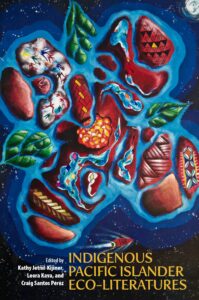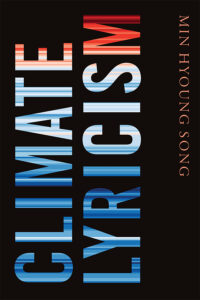We are pleased to announce the winners of the 2023 ASLE Book Awards. The awards, in the categories of ecocriticism and environmental creative writing, are given to recognize excellence in the field of environmental humanities. The winners will be celebrated at the Authors/Awards Reception at the 2023 Conference in Portland, OR on July 10.
Congratulations also to our short-listed authors, read more about their excellent books via this post.
Creative Book Winner:
Indigenous Pacific Islander Eco-Literatures, edited by Kathy Jetñil-Kijiner, Leora Kava, and Craig Santos Perez. University of Hawai’i Press, 2022.
Judges Comment:
Indigenous Pacific Islander Eco-Literatures is an anthology of original poetry and prose that brings awareness of the environmental devastation in the Pacific—one of the frontlines of climate crisis in the context of ecological colonialism. This book is both urgent and revealing. It brings together many indigenous voices and stories to remind us that everything in nature is sacred. This collective project teaches us about vulnerability, resilience, identity, and hope.
Honorable Mentions:
In a Land of Awe: Finding Reverence in the Search for Wild Horses by Chad Hanson. Broadleaf Books, 2022.
Breath on a Coal by Anne Haven McDonnell. Middle Creek Publishing, 2022.
Ecocritical Book Winner:
Climate Lyricism by Min Hyoung Song. Duke University Press, 2022.
Judges comment:
“Breathtaking in its scope as it draws from a broad range of literature. The nimble adaptation of the lyric is impressive and despecializes the usually restrictive term. ”
“Lyrical in itself. While its offerings may seem simple at first – that to think is to do (and vice versa), that “you act by acting,” that literature has “a prominent role in developing a practice of sustaining attention” – you realize how deeply profound they are by the end. Here swing and Blake (and more) weave together to reexamine “everyday” climate. From its deliberate use of the second person, to the deeply personal conclusion, this is a meditation on who we are, what we do, and why as scholars. This tune will stick with me! [Hits them all.]”
“Climate Lyricism is a simultaneously brilliant and accessible work that revolutionizes what it means to talk about literature and/of climate change. I found the book’s argument that one of the primary strategies that we need to face the climate crisis is to develop the kind of sustained and empowered attention that can overcome the equally sustained and disempowering social denial that has accumulated around the topic both important and compelling.”
“At least in part, the book’s revolutionizing of the field comes from its origin and grounding in race and ethnic studies. The archive of both primary texts and scholarly interlocutors is vast, but focusing on minority literatures produces a very different vision of the climate fiction/poetics literary landscape and what it can teach us about living in the climate crisis.”
